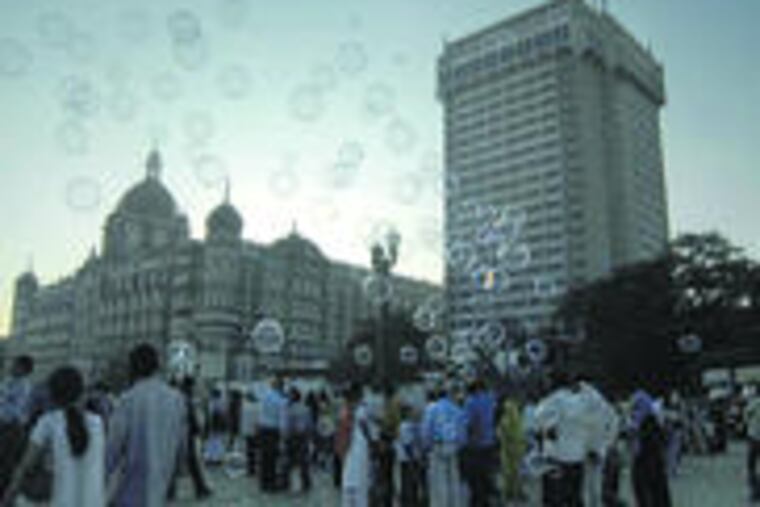Kerry upbeat on action by Pakistanis
He said leaders seemed "sincere" on halting attackers and made more arrests than thought.

ISLAMABAD, Pakistan - Pakistan's leaders appear to be "sincere" in their efforts to crack down on an extremist group blamed for last month's attack on India's financial hub, Mumbai, and have arrested more suspects than announced, Sen. John Kerry said yesterday.
But Kerry, the next head of the U.S. Senate's Foreign Relations Committee, also suggested that generous American assistance to Pakistan depended on authorities there ending their past support for extremist groups.
India is suspicious of Pakistan's avowed clampdown on Lashkar-e-Taiba, the group New Delhi blames for the Mumbai attack, which killed more than 160 people and aroused fears that the nuclear-armed neighbors could slide into their fourth war since both became independent from Britain in 1947.
In New Delhi, India's defense minister, A.K. Antony, said yesterday his country was not planning military action against Pakistan in response to the attack but warned that its relationship with its neighbor would not be "normal" until Islamabad took action against extremists.
India's foreign minister, Pranab Mukherjee, visiting Kashmir - the northern territory that has been the focus of years of contention between the two countries - said there was a "pause" in peace talks with Pakistan.
Pakistani authorities have raided suspected extremist training camps and confirmed the detention of three key suspects, including two alleged plotters of the attacks and the purported head of Lashkar-e-Taiba.
'Building the case'
Kerry said he had learned during two days of talks with Pakistani government and military leaders that authorities had taken more action than had been announced.
"I know that more people have been detained than India is aware of," Kerry told reporters in Islamabad.
He did not name any of the additional detainees but said Pakistani authorities were actively "building the case" against those seized so that they could be prosecuted.
Lashkar-e-Taiba is one of a host of violent extremist groups that emerged after the U.S.-funded guerrilla war against Soviet forces occupying Afghanistan in the 1980s and opened a new holy war against Indian troops in Kashmir.
Former Pakistani President Pervez Musharraf banned it and several other extremist groups in 2002 under U.S. pressure after an attack on the parliament in New Delhi.
However, the group's operations have continued, fueling the suspicions of India and many Western observers that it still enjoys covert support from Pakistani intelligence agencies.
Kerry said it was "a fact" that Pakistan's Inter-Services Intelligence was involved in creating the group, which has at times fought openly alongside Pakistani soldiers in Kashmir.
In New Delhi over the weekend, Kerry called for a reformed ISI, currently led by an army general, to be placed under close civilian control.
Some U.S. officials have supported Indian claims that the ISI was involved in the bombing of the Indian Embassy in the Afghan capital in July.
Pakistani leaders complain that Indian investigators are not sharing evidence from Mumbai, raising concern that, as after the 2001 parliament attack, detained extremist leaders will eventually be released without charge.
'Morphed'
However, Kerry expressed optimism that Pakistan's leaders realized that Lashkar-e-Taiba had "morphed into a more al-Qaeda-esque and radicalized entity" that had run out of control and represented a serious threat to Pakistan.
Kerry said he was struck by the determination of President Asif Ali Zardari and army chief Ashfaq Parvez Kayani to "crack down on any entity that tries to sidetrack the country from its democratic path and pursue the road of terror."
"I believe they are sincere," Kerry said.
In Mumbai, managers of the five-star Taj Mahal and Oberoi hotels, which were held under siege for days, said yesterday the hotels would partially reopen for business this weekend.
Images of flames leaping from a dome of the Taj Mahal hotel's century-old main structure quickly became an icon of the attack.
The managers said a new wing of the Taj Mahal and the Trident, a hotel twinned with the Oberoi, were accepting reservations for Sunday and beyond.
Both hotels said they were upgrading their security.
"We cannot depend on local law-enforcement agencies," said Ketaki Narain, spokeswoman for the Oberoi Group.
Ratan Tata, chairman of the company that owns the Taj Mahal, criticized the government's response to the attacks as slow and ineffective.
"We have decided that we would look at the protection of our assets and our people ourselves," Tata said Monday during a panel discussion on local CNBC TV18. "We'll seek external expertise to help us."